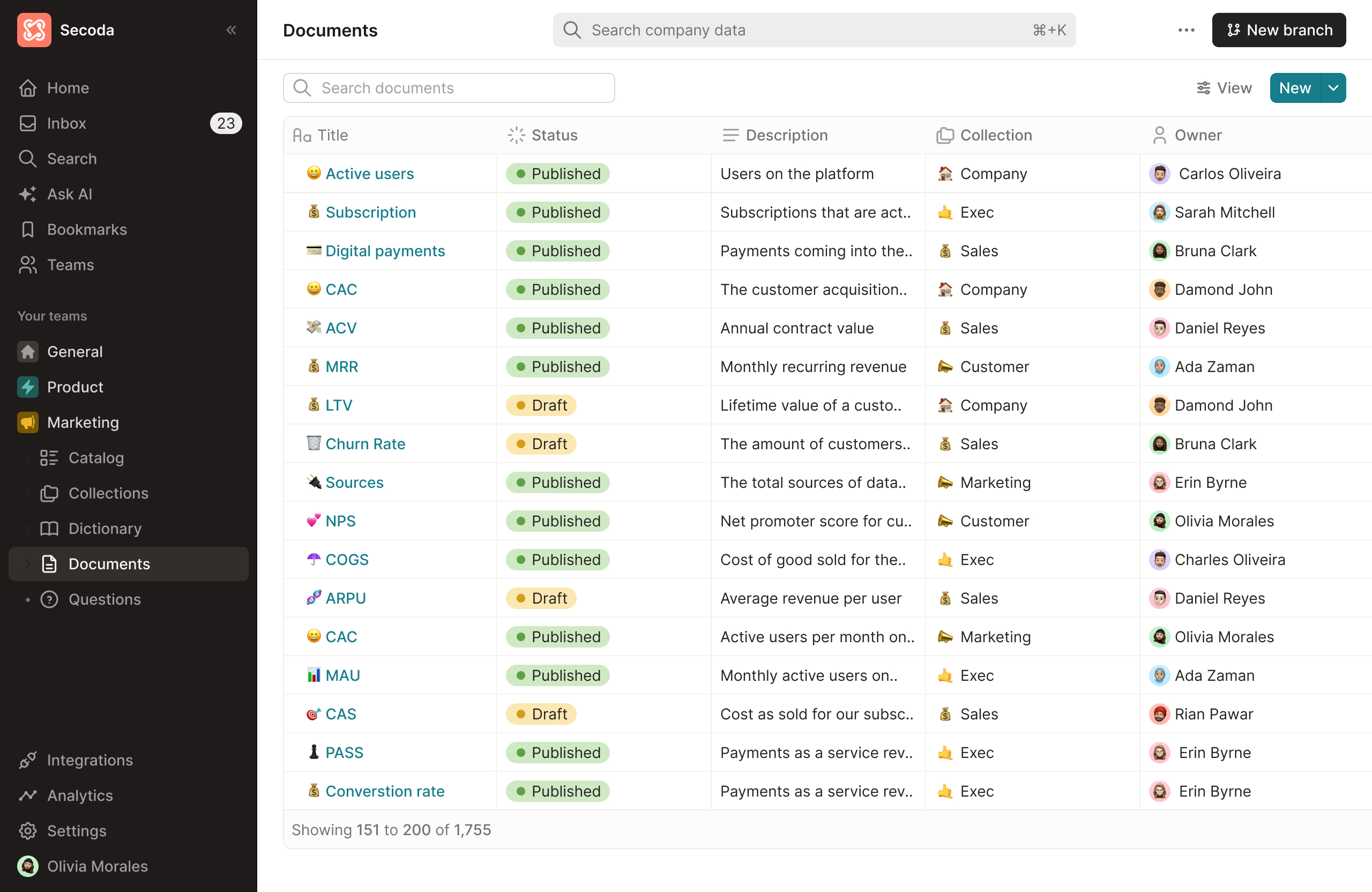Secoda, a startup developing what it describes as an AI-powered data search and cataloging platform, today announced that it raised $14 million in a funding round led by Craft Ventures with participation from Abstract Ventures and several angel investors.
Bringing Secoda’s total raised to $16 million, Secoda co-founder and CEO Etai Mizrahi said that the proceeds will be put toward strengthening the startup’s engineering efforts, channeling more funds into R&D and building “cutting-edge” dev tools.
“Secoda’s mission is to make the experience of finding, understanding and using data as easy as a Google search,” Mizrahi told TechCrunch in an email interview. “Our vision is for any team member to ask anything about company data, and Secoda answers that question.”
Mizrahi co-founded Secoda, which is based in Ontario, with Andrew McEwen in 2021. It’s the pair’s second venture together after Correly, a product demo platform, which Ottawa-based GenM acquired in 2019.
Mizrahi and McEwen — both of whom joined GenM following Correly’s acquisition — say that they were spurred to launch Secoda after experiencing the challenge of using and analyzing data while at GenM. “A lack of documentation and process around managing data knowledge made it even more difficult,” Mizrahi added. “Frustrated with the inability to find and understand data, we started Secoda.”
GenM, now called Acadium, isn’t the only firm struggling to wrangle its data across its organization.
As per a 2023 report from Salesforce, 41% of business leaders lack an understanding of their employer’s data because it’s too complex or not accessible enough. And according to a 2021 poll from Hazelcast, 80% of companies struggle to unify their data assets.
So how does Secoda solve this? By integrating with business intelligence, data transformation tools and databases and applying AI algorithms on top of it all.
Secoda creates a map of the information housed across apps in a company’s tech stack, enabling users to see how data’s connected across apps that previously lacked a way to communicate with each other. These “lineage maps” also enable data teams to see changes made to a company’s data, as well as what’s impacted by the changes across the tech stack.
“The past few years have seen a Cambrian explosion of startups building specialty software for data teams, but it’s left teams struggling with how to understand information that is fragmented across these many tools,” Mizrahi said. “Secoda provides a platform for teams to have a single source of truth for their company data knowledge.”
To Mizrahi’s point, there’s a growing number of startups attempting to tackle the data visibility problem.
Manta recently raised $35 million to grow its data observability suite targeted toward enterprise customers. Unravel Data bagged $50 million for its tools that aim to help companies make sense of complicated data stacks and tools. There’s also Acryl Data, which nabbed $21 million for its collection of apps designed to create, repair and maintain data catalogs.
Secoda has invested in AI tech as a differentiator, like a feature that automatically generates documentation and queries from a company’s metadata. It’s also built in OpenAI’s AI-powered chatbot, ChatGPT, to help answer natural language questions about and search across any metadata.

Secoda’s monitoring dashboard. Image Credits: Secoda
“Company data is like a disjointed puzzle at most organizations. Data teams often have large tech stacks, full of applications that don’t communicate with each other and years of legacy knowledge that is not documented anywhere at all — it lives in people’s heads,” Mizrahi said. “We bring much-needed discoverability and structure to data assets, irrespective of where they reside. This gives any employee, regardless of technical ability, a structured source of truth to understand company data.”
Secoda, which has 20 employees, claims to have grown revenue more than 250% year-over-year last year. That’s thanks to new customers, including Remitly, Too Good to Go, Babylist and Y Combinator, who’s also an investor.
In the near future, Secoda plans to introduce a monitoring capability that’ll allow users to check the quality of the data being consumed by the platform.
“With one click, users should be able to understand what assets are affected by changes and how to reduce data quality errors,” Mizrahi explained. “Building monitoring into their discovery tools will also allow teams to keep tabs on operational efficiency of a data team — tracking costs generated by the many tools in a company’s tech stack and helping companies save costs.”
